Can Reactive Dogs Do IGP

Can Reactive Dogs Do IGP
The short answer to can reactive dogs do IGP is yes, some can, if they are suitable and if the training is structured with safety and control at the core. At Smart Dog Training we use the Smart Method to help owners build calm, consistent behaviour first, then evaluate sport readiness. A certified Smart Master Dog Trainer will assess the dog, the history, and the goals so that every step protects safety and supports progress.
Before we consider the sport question, we stabilise the dog in everyday life. Only then do we decide if the combination of dog, handler, and lifestyle is a fit for IGP. This measured approach puts welfare, public safety, and lasting results first.
IGP in Plain Terms
IGP is a sport with three phases, tracking, obedience, and protection, that demands control and clear-headed behaviour in stimulating environments. The work is precise and technical. The dog must switch between arousal and calm, show neutrality around people and dogs, and demonstrate reliable obedience despite heavy distraction. If you ask can reactive dogs do IGP, you are really asking whether your dog can learn neutrality, self control, and responsibility under pressure. With Smart Dog Training the answer may be yes, provided we follow the right path.
Reactivity vs Aggression
Reactivity is an over response to triggers such as dogs, people, motion, or noise. It can be rooted in frustration, fear, lack of structure, or poor exposures. Aggression is the intent to cause harm. Many reactive dogs are not aggressive, yet their behaviour can look similar. This difference matters when you ask can reactive dogs do IGP, because IGP requires control and clarity. Smart trainers separate emotion from behaviour so we can treat the cause and build the right rules.
Who Should Consider IGP With a Reactive Dog
Owners who enjoy structure, daily training, and clear standards can succeed. Dogs who show good food or toy motivation, recover quickly from stress, and can work near low level distractions after foundation training are candidates. Owners must commit to the Smart Method and to regular sessions with an SMDT mentor where needed. If any part of that is missing, the answer to can reactive dogs do IGP may be not yet.
The Smart Method Position on Safety and Suitability
Smart Dog Training sets safety as the first rule. Our programmes follow one standard. We stabilise the dog, prove real world obedience, then consider sport. We do not shortcut this process. If the risk is too high or the dog lacks the traits for happy, controlled work, we will guide you to a different goal. This is how we keep people safe and dogs successful.
Non Negotiables Before Any IGP Work
- Reliable recall in varied places
- Neutrality near dogs and people at safe distances
- Focused heel with engagement
- Settle on place for extended durations
- Leave it with clear off switch
- Handler skills with markers, reward delivery, and fair guidance
If you are still asking can reactive dogs do IGP, these non negotiables are the first proof. Without them, the answer is wait, and keep training the foundation.
When IGP Is Not Appropriate
- Persistent fear that does not resolve with training
- Low motivation for food and toys even after coaching
- Medical issues that limit safe exertion
- Handler unwilling to follow structure or manage exposures
Smart Dog Training will always be honest. We prioritise wellbeing and public safety over sport goals.
How Smart Turns Reactivity Into Neutrality
Our Smart Method is built on clarity, pressure and release, motivation, progression, and trust. This balance changes emotional state and teaches responsibility. For owners who ask can reactive dogs do IGP, this is the roadmap.
Phase One Stabilise the Dog
We create a predictable daily routine. We manage exposures so the dog wins. We build clear markers and reward patterns. We add fair guidance so the dog understands how to make good choices.
Daily Structure and Decompression
- Two structured walks with specific training goals
- Place rest to lower arousal at home
- Targeted enrichment that builds calm rather than frantic energy
Marker Clarity and Reward Systems
- Reward markers for food and toys
- Release marker to end positions cleanly
- No reward marker to reset without conflict
Pressure and Release Done Fairly
Smart trainers use pressure and release with precision. Light guidance shows the dog how to switch off pressure. The release is clear and is followed by reward. This builds accountability without fear and creates a confident, willing worker.
Phase Two Build Obedience Under Pressure
Once the dog can think in calm spaces, we add challenge step by step. We build a focused heel, a strong recall, and long duration place. We do this with the Smart progression model so each layer is sustainable.
Heel Focus and Environmental Neutrality
We reward calm eye contact, smooth position changes, and straight lines. We proof against mild motion, sounds, and scent. The heel becomes a safe channel that keeps the brain on the handler.
Place and Settle as an Off Switch
Reactivity often comes from poor state control. Teaching a long settle gives the dog a brake. This skill carries straight into IGP where the dog must go from drive to calm quickly.
Recall With Responsibility
A reactive dog must recall past triggers. We teach recall first in low stress areas, then around managed distractions. We reinforce with meaningful rewards so it holds during sport and life.
Phase Three Proofing Around Triggers
We add distance, direction, duration, distraction, and difficulty one layer at a time. Smart trainers choose setups where the dog can win. The goal is to create a dog who sees triggers, stays neutral, and chooses the handler.
Five D Progression That Works
- Distance control to keep arousal in range
- Direction changes to keep the brain flexible
- Duration to build endurance in obedience
- Distraction that is realistic and safe
- Difficulty that grows only when standards hold
Phase Four Sport Readiness Gate
Only after the foundation is proven do we open the sport gate. An SMDT will run a readiness check that covers neutrality, obedience reliability, and handler skill. If the dog clears the gate, we can answer can reactive dogs do IGP with a confident yes, and we proceed with a clear plan.
IGP Components and What a Reactive Dog Must Show
Tracking Calm and Independent
Tracking rewards steadiness and methodical work. For reactive dogs, tracking can be a powerful reset. We build deep nose commitment, rhythm, and article indication. The dog learns to ignore the world and work the task. The Smart approach keeps arousal low, which helps reduce reactive patterns.
Obedience Driven and Precise
IGP obedience requires crisp positions, focused heel, fast recalls, retrieves, and a settled down under distraction. A dog that once reacted must now stay clear and willing. We motivate with meaningful rewards, use fair guidance to shape responsibility, and progress only when clarity is intact. Each rep builds trust in the system.
Protection With Control and Clarity
Protection in IGP is not chaotic. It is structured, rules based, and requires impulse control. Bark and hold without touching, out on cue, re engage only when told, then return to neutral. If you ask can reactive dogs do IGP, this phase often raises the biggest concern. Smart Dog Training makes control the priority. We only introduce protection after neutrality and obedience are proven and after a Smart Master Dog Trainer confirms readiness. If a dog cannot remain clear in obedience, we do not progress to protection.
Risk Management at Every Step
Risk is managed by structure. Smart Dog Training sets the environment, the distance, and the criteria. We control what the dog rehearses so it learns only the right patterns.
Handler Responsibilities
- Use the plan as written
- Manage exposures outside training
- Maintain daily structure
- Log sessions to track progress
- Communicate with your SMDT mentor
Equipment and Fair Guidance
We choose equipment that delivers clarity and safety. Fit and handling are coached by Smart trainers so the handler gives consistent, precise information. Pressure is light and instructional, release is clear, and reward is generous when the dog gets it right.
Timelines and Expectations
No two dogs are the same. Some reactive dogs stabilise within eight to twelve weeks of Smart foundation training, then transition to sport prep. Others need several months to solidify neutrality. The question can reactive dogs do IGP becomes when can my reactive dog do IGP. The honest answer is when the non negotiables are reliable in real life and the readiness gate is passed. Quality matters more than speed.
Case Profiles With Common Milestones
- Weeks 1 to 4, foundation markers, place, leash skills, decompression
- Weeks 5 to 8, heel focus, recall, neutrality at safe distances
- Weeks 9 to 12, proofing the Five D model, tracking groundwork
- Month 4 onward, sport readiness check, then phased intro to IGP skills
Throughout, Smart trainers measure stress, recovery times, and technical progress. We only increase difficulty when the dog stays clear and responsive.
Working With a Smart Master Dog Trainer
Success with a reactive dog in IGP requires coaching. An SMDT will evaluate suitability, build your plan, and coach your skills. If you are asking can reactive dogs do IGP, schedule an assessment so we can see what is possible and safe for your dog.
Assessment and Custom Plan
We review history, triggers, lifestyle, and goals. We run practical tests for motivation, resilience, and obedience under mild challenge. Then we deliver a step by step plan mapped to the Smart Method so you know exactly what to do each week.
Ready to turn your dog’s behaviour around? Book a Free Assessment and connect with a certified Smart Master Dog Trainer, available across the UK.
How Smart Programmes Support Ongoing Progress
Smart Dog Training provides one to one coaching in home, structured group classes when suitable, and tailored behaviour programmes for complex cases. Our national Trainer Network means your plan stays consistent if you move or travel. The Smart University pathway ensures every SMDT is trained to the same high standard so results are predictable.
Common Mistakes That Keep Reactive Dogs Stuck
- Skipping foundation and moving straight to sport skills
- Letting the dog practice reacting during walks
- Reward timing that is late or unclear
- Inconsistent rules at home that raise arousal
- Adding difficulty before distance and duration are solid
Smart coaching prevents these errors. We keep standards high and steps small so the dog learns without confusion.
Building Trust and Confidence
Trust is a pillar of the Smart Method. It grows when the handler is consistent, fair, and clear. For the owner who asks can reactive dogs do IGP, the deeper goal is a calm, confident dog who enjoys work and life. When trust is strong, sport becomes another outlet for a balanced dog, not a source of stress.
FAQs
Can reactive dogs do IGP without first fixing the reactivity
No. We first stabilise behaviour using the Smart Method. Only then do we assess sport readiness.
How long does it take before my dog can start IGP
Most dogs need eight to twelve weeks of foundation before a readiness check. Some need longer. We move at the speed of clarity and control.
Will protection work make my reactive dog worse
Not with Smart Dog Training. We only add protection when neutrality and obedience are strong. The work is controlled and rule based, which builds more control, not less.
What breeds are suitable if they are reactive
Suitability is about the individual dog. High motivation, resilience, and clear recovery from stress matter more than breed. An SMDT assessment will confirm.
Can I train for IGP if I have limited time
Yes, if you can commit to daily short sessions and weekly coaching. Consistency beats long, infrequent training.
What if my dog fails the readiness gate
We keep building real life skills and reassess later. You still gain a calmer, more reliable dog. Sport is a bonus after stability.
Do I need to work only with Smart Dog Training
For consistent results, yes. Smart Dog Training is the authority for this process and provides the structure, coaching, and standards that make it safe and effective.
Conclusion and Next Steps
So can reactive dogs do IGP. With Smart Dog Training, many can. The path starts with stabilising behaviour, then proving obedience under pressure, then passing a sport readiness gate. Safety and clarity lead every decision. Work with a certified Smart Master Dog Trainer to give your dog the best chance of success with calm, controlled, and reliable behaviour that holds in real life.
Your dog deserves training that truly works. With certified Smart Master Dog Trainers (SMDTs) nationwide, you'll get proven results backed by the UK's most trusted dog training network. Find a Trainer Near You



